| Srl | Item |
| 1 |
ID:
116189
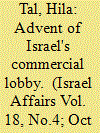

|
|
|
|
|
| Publication |
2012.
|
| Summary/Abstract |
The commercial lobby phenomenon first emerged in Israel in the 1990s and has since expanded at an impressive pace. There are more than 100 commercial lobbyists authorized to work in the Knesset, and commercial lobbyists in Israel represent more than 400 clients. This article describes the factors that led to the advent of this sector and fostered its rapid growth: globalization and Americanization; changes in the Israeli economic system; liberalization and weakened political parties; and the ban against Knesset members engaging in additional occupations. The article concludes by discussing potential developments in Israeli lobbying.
|
|
|
|
|
|
|
|
|
|
|
|
|
|
|
|
| 2 |
ID:
177749
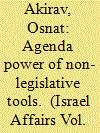

|
|
|
|
|
| Summary/Abstract |
How do we assess the power of governments to control and set the agenda in parliaments? How do we assess the power of oppositions to present their agenda? Cox and McCubbins’ cartel model used a roll rate analysis of legislation, while Krehbiel suggested the use of non-legislative tools. Based on this advice, this article investigates the use of a non-legislative tool – motions for the agenda – in the Israeli Knesset, or more specifically: ‘the agenda power of non-legislative tools’ defined as the ability to block or significantly delay motions from reaching a debate in committee. Using data from the Knesset, in which the opposition operates in a parliamentary system with multiparty coalition governments, it demonstrates that opposition legislators utilise these non-legislative tools more extensively than coalition members to wield their agenda power. The findings support the addition of this tool to the cartel model.
|
|
|
|
|
|
|
|
|
|
|
|
|
|
|
|
| 3 |
ID:
149189
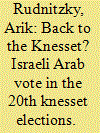

|
|
|
|
|
| Summary/Abstract |
Arab politics in Israel recorded several notable achievements in the March 2015 Knesset elections. Sixteen Arab and Druze candidates were elected to serve in the Israeli parliament, the largest number ever elected. In addition, Arab voter turnout increased significantly compared to previous election campaigns and reached 63.5%, its highest level since the early 2000s, thus reversing a period of political apathy caused by the events of October 2000. These results may indicate a turning point in the political behaviour of the Arab public, and that the Knesset has once again become a relevant arena of political influence for the majority of the Arab public. An analysis of voting patterns in the recent elections in the Arab sector suggests that these changes were spurred by the participation of the Joint List. In many Arab localities, support for the Joint List, which ran as a grouping of the major political parties that have represented the Arab public in recent years, was positively associated with a rising turnout compared to previous elections.
|
|
|
|
|
|
|
|
|
|
|
|
|
|
|
|
| 4 |
ID:
106310
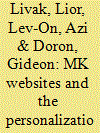

|
|
|
|
|
| Publication |
2011.
|
| Summary/Abstract |
The article explores the contribution of MKs' websites to political personalization by addressing three questions. Is it more likely that MKs who belong to parties that conduct primaries will establish a website than MKs who belong to parties which select their candidates in a more centralized fashion? Are MKs' websites richer, more interactive and more frequently updated than their respective party's websites? Finally, do MKs link their websites to the websites of their parties? We find some evidence that MKs' personal websites further support and enhance the personalization of Israeli politics.
|
|
|
|
|
|
|
|
|
|
|
|
|
|
|
|
| 5 |
ID:
169987
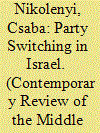

|
|
|
|
|
| Summary/Abstract |
In January 2011, former Israeli Prime Minister Ehud Barak issued a surprising announcement to take four other members of his Labor Party’s Knesset faction with himself to set up a new political party, Haatzmaut (Independence). The conditions under which this split took place illustrate the ways in which the Israeli anti-defection law, passed in the 12th Knesset, incentivizes the behavior of elected legislators who seek to exit from the party that they were elected to represent. This article shows that the anti-defection law cannot keep a legislative party together that suffers from weak internal cohesion. In fact, by imposing numerical criterion (1/3) on prospective party switchers, the anti-defection law prolongs internal disunity, thereby further weakening an already low level of cohesion.
|
|
|
|
|
|
|
|
|
|
|
|
|
|
|
|
| 6 |
ID:
187563
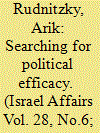

|
|
|
|
|
| Summary/Abstract |
Arab politics experienced dramatic upheavals in the four Knesset elections between April 2019 and March 2021. First was the jump from a significant low turnout among Arab voters in April 2019 (49.2%) to the highest turnout in two decades in March 2020 (64.8%), only to be followed by a historic slump to 44.6% in March 2021. The Arab parties went through a shaky period – from a divided political system that secured only 10 Knesset seats in April 2019 to a historic achievement in the March 2020 elections, when the Joint List won 15 seats, followed by yet another schism resulting in a total of 10 seats in the March 2021 elections. As such, the Joint List’s achievements did not herald the strengthening of the Arab parties’ influence in the Arab street but rather the increasing influence of the public on the political configuration of the parties wishing to represent it. The interrelation between the public and the parties is the outcome of profound processes of political change that Arab society in Israel has undergone over the past two decades. The article discusses these processes and their impact on the political behaviour of the Arab public.
|
|
|
|
|
|
|
|
|
|
|
|
|
|
|
|
| 7 |
ID:
177744


|
|
|
|
|
| Summary/Abstract |
This article seeks to analyse the political behaviour of the Arab sector in Israel in the three rounds of general elections held between April 2019 to March 2020. In the first round (April 9), despite high expectations within the Arab sector of seeing a joint Arab list competing in the elections for the 21st Knesset, the joint list was dismantled. Arab voters expressed their disappointment and stayed away from the ballot box. The political result was a decline from 13 to 10 parliamentary seats. In the second round (September 17) the joint list was reunited and won 13 seats again. In the third round (March 2020) it won 15 seats after competing yet again as a joint party. These experiences show that boycotting the elections harms the Arab minority while combining all political parties brings greater political influence.
|
|
|
|
|
|
|
|
|
|
|
|
|
|
|
|
| 8 |
ID:
103233
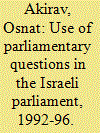

|
|
|
|
|
| Publication |
2011.
|
| Summary/Abstract |
This article examines the use of parliamentary questions in the Israeli parliament (Knesset) as a means of controlling the government during the years 1992-96 through an analysis of 1041 parliamentary questions on the basis of four criteria: efficiency (how long it takes to be answered); effectiveness (achieving its goals); the need for a supplementary question; and the publicity surrounding the minister's answer. It shows that although in the 13th Knesset the parliamentary question became a more efficient and effective parliamentary tool than in previous Knesset terms, its ability to serve as a means for controlling the government leaves much to be desired.
|
|
|
|
|
|
|
|
|
|
|
|
|
|
|
|